Lebanon might face war as nations issue urgent calls for citizens to depart
 An Israeli soldier walks past a tank amid heightened tensions between Israel and Lebanon, as seen from the border with Lebanon in northern Israel, October 14, 2023. (Reuters Photo)
An Israeli soldier walks past a tank amid heightened tensions between Israel and Lebanon, as seen from the border with Lebanon in northern Israel, October 14, 2023. (Reuters Photo)
Amid escalating tensions along the Lebanon-Israel border, several nations have issued urgent advisories calling for their citizens to leave Lebanon, citing the heightened risk of conflict in the region. The warnings come amidst a backdrop of increased hostilities between Hezbollah and Israeli forces, raising concerns of a potential wider conflict in the volatile Middle East.
Dutch government urges immediate departure
The Dutch government issued a stern advisory on Wednesday, categorizing Lebanon as a “red” zone due to the unpredictable security situation. Dutch nationals were urged to avoid all travel to Lebanon, and those currently in the country were strongly advised to depart while commercial flight options remain viable. The Dutch Foreign Ministry expressed concerns over the ability of the Dutch Embassy in Beirut to provide assistance to its citizens in case of emergencies, highlighting the deteriorating security environment.
US calls their citizens a day after vouching for a diplomatic resolution
Adding to the international concern, the US called their citizens to leave Lebanon a day after Defense Secretary Lloyd Austin emphasized the importance of diplomacy in preventing further escalation along the Israel-Lebanon border.
Austin, in discussions with Israeli Defense Minister Yoav Gallant, reiterated the US commitment to seeking a diplomatic solution that restores lasting calm and ensures civilian safety on both sides of the border.
German warning amidst border tensions
Germany followed suit with a travel warning, instructing its citizens in Lebanon to leave immediately. The German Foreign Ministry emphasized the tense situation along the Lebanon-Israel border, cautioning that further escalation could lead to the suspension of air traffic from Beirut Rafic Hariri Airport, severely restricting exit options for foreigners. The advisory stressed the importance of heeding local security alerts and monitoring developments closely.
Canadian Concerns Over Escalating Violence
Canada reiterated its call for nationals to leave Lebanon amidst escalating violence between Hezbollah and Israeli forces. Foreign Minister Melanie Joly expressed deep concern over the deteriorating security situation, citing sustained clashes and the potential for further escalation without warning. Canadians were urged to take advantage of remaining commercial flight options, as the government is not currently organizing assisted departures or evacuations from Lebanon.
North Macedonia Urges Timely Departures
North Macedonia joined the international chorus, urging its citizens in Lebanon to leave at the earliest opportunity. The Foreign Ministry advised against all non-essential travel to Lebanon, citing heightened risks and the potential for deteriorating security conditions that could impede safe departures in the future. The advisory underscored the need for timely action to ensure the safety of North Macedonian nationals amidst rising regional tensions.
Kuwait’s Precautionary Measures
Kuwait also issued an advisory for its nationals in Lebanon, urging them to leave as soon as possible amid growing fears of potential conflict between Israel and Hezbollah. The Foreign Ministry advised against travel to Lebanon at this time, highlighting the volatile security situation and the risks posed by escalating tensions in the region. Kuwaiti citizens were encouraged to prioritize their safety and follow local authorities’ guidance amidst uncertain times.
UN and International Concerns
The United Nations expressed grave concerns over the escalating tensions in Lebanon, with humanitarian chief Martin Griffiths warning of the potential humanitarian consequences and regional implications of a broader conflict.
Griffiths described Lebanon as a “flashpoint beyond all flashpoints” and emphasized the urgent need for de-escalation and diplomatic efforts to prevent further violence. The international community continues to monitor the situation closely, amid fears that the conflict in Gaza could spill over into Lebanon, exacerbating an already volatile situation.
As tensions persist and rhetoric escalates between Hezbollah and Israeli forces, the situation remains fluid and highly unpredictable.



